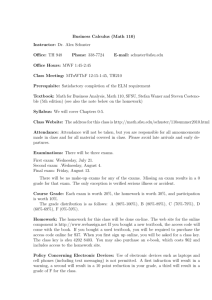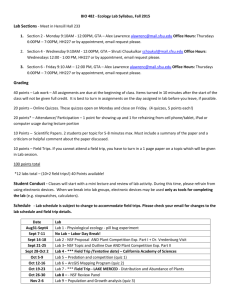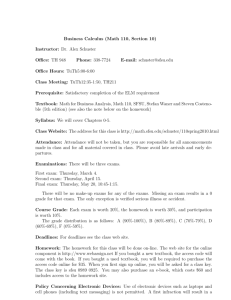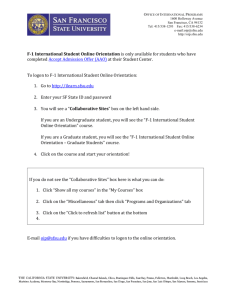SFSU Physics 220: General Physics with Calculus I
advertisement
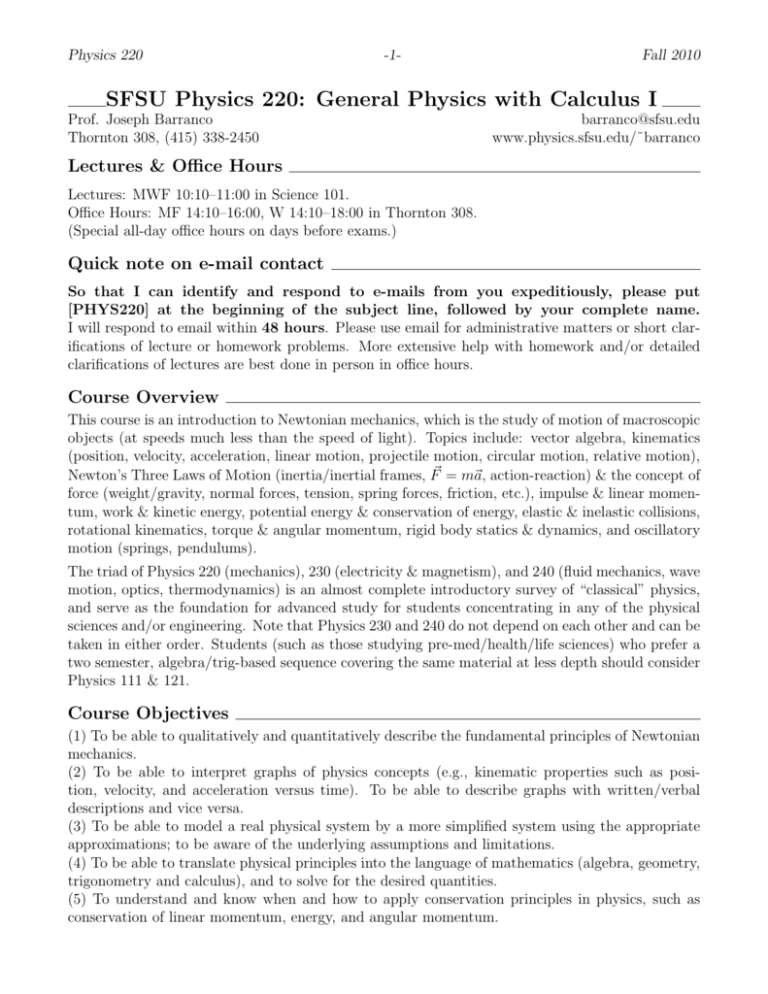
Physics 220 -1- Fall 2010 SFSU Physics 220: General Physics with Calculus I Prof. Joseph Barranco Thornton 308, (415) 338-2450 barranco@sfsu.edu www.physics.sfsu.edu/˜barranco Lectures & Office Hours Lectures: MWF 10:10–11:00 in Science 101. Office Hours: MF 14:10–16:00, W 14:10–18:00 in Thornton 308. (Special all-day office hours on days before exams.) Quick note on e-mail contact So that I can identify and respond to e-mails from you expeditiously, please put [PHYS220] at the beginning of the subject line, followed by your complete name. I will respond to email within 48 hours. Please use email for administrative matters or short clarifications of lecture or homework problems. More extensive help with homework and/or detailed clarifications of lectures are best done in person in office hours. Course Overview This course is an introduction to Newtonian mechanics, which is the study of motion of macroscopic objects (at speeds much less than the speed of light). Topics include: vector algebra, kinematics (position, velocity, acceleration, linear motion, projectile motion, circular motion, relative motion), Newton’s Three Laws of Motion (inertia/inertial frames, F~ = m~a, action-reaction) & the concept of force (weight/gravity, normal forces, tension, spring forces, friction, etc.), impulse & linear momentum, work & kinetic energy, potential energy & conservation of energy, elastic & inelastic collisions, rotational kinematics, torque & angular momentum, rigid body statics & dynamics, and oscillatory motion (springs, pendulums). The triad of Physics 220 (mechanics), 230 (electricity & magnetism), and 240 (fluid mechanics, wave motion, optics, thermodynamics) is an almost complete introductory survey of “classical” physics, and serve as the foundation for advanced study for students concentrating in any of the physical sciences and/or engineering. Note that Physics 230 and 240 do not depend on each other and can be taken in either order. Students (such as those studying pre-med/health/life sciences) who prefer a two semester, algebra/trig-based sequence covering the same material at less depth should consider Physics 111 & 121. Course Objectives (1) To be able to qualitatively and quantitatively describe the fundamental principles of Newtonian mechanics. (2) To be able to interpret graphs of physics concepts (e.g., kinematic properties such as position, velocity, and acceleration versus time). To be able to describe graphs with written/verbal descriptions and vice versa. (3) To be able to model a real physical system by a more simplified system using the appropriate approximations; to be aware of the underlying assumptions and limitations. (4) To be able to translate physical principles into the language of mathematics (algebra, geometry, trigonometry and calculus), and to solve for the desired quantities. (5) To understand and know when and how to apply conservation principles in physics, such as conservation of linear momentum, energy, and angular momentum. Physics 220 -2- Fall 2010 Prerequisites & Corequisites Because this course uses calculus in lectures and in homework, students must have completed the following prerequisites: (1) Math 226 (Calculus I) or its equivalent, with a grade of C or better. If you did not complete this requirement at SFSU, be prepared to supply proof (e.g., unofficial transcript from another institution, A.P. Calculus exam with score of 4 or 5) in the first two weeks. (2) Sufficient score on the Math Qualification Test for Introductory Physics (Physics Readiness Exam). See: http://www.physics.sfsu.edu/Academics/Readiness.html for more information on this diagnostic test. The passing score will be between 70%-80%. In addition to the above prerequisites, students must have previously completed OR be co-enrolled in the following: (3) Math 227 (Calculus II), (4) Physics 222 (General Physics I Laboratory). Please see me in the first week if you have any concerns about your preparation. Learning Resources Required: (1) Lea & Burke, Physics: The Nature of Things, 1st edition, loose-leaf ($157.00 new/$122.50 used at SFSU bookstore) (2) Scientific calculator (graphing capabilities NOT necessary) (3) 4-color ABCD sheet (Please bring this to EVERY class!) (4) Reliable internet access: (a) Login to ilearn.sfsu.edu (note: no www in web address) to access course website. Please check frequently for new announcements, updates to the syllabus & schedule, tips & tricks on the homework, and links to additional learning resources. (b) Login to www.webassign.com to access online homework system. Cost: $22.95 for semester access. Pay with debit/credit card online. When you register, you will need: Institution code: sfsu. Class key: sfsu 0703 4209. Optional: (6) Elby, Portable TA: A Physics Problem Solving Guide ($37.35 new/$33.80 used at SFSU bookstore) (7) Lea & Burke, Student Solutions Manual to Physics: The Nature of Things ($72.00 new/$56.20 used at SFSU bookstore) (8) Celesia, Preparation for Introductory College Physics: A Guided Student Primer ($60.75 new/$47.40 used at SFSU bookstore) Used books can also be bought online at www.amazon.com, often for cheaper. Physics 220 -3- Fall 2010 Assignment of Grades Grades will be determined according to the following rubric: 10 Homework Assignments 25% In-class “surprise” quizzes 5% 4 In-class Exams 40% (10% each) Final Exam 30% (5 parts, 6.667% for each of first 4 parts, 3.333% for part 5) “Resurrection Final” – The final is comprehensive: there will be 5 parts; the first 4 parts consists of content corresponding to the 4 in-class exams. If your score on a particular part of the final is better than the score on the corresponding in-class exam, then that in-class exam will be ignored and that part of the final will be worth 16.667% instead of 6.667%. If you score better on every part of the final than the corresponding in-class exams, then the final will count 70%. This system rewards improvement. There will be NO make-ups for any of the 4 in-class exams. Instead, the grade for the corresponding part of the Final Exam will be used in place of the missing in-class exam. Letter grades will assigned according to the following scheme: A: 90.0% – 100.0% A-: 85.0% – 89.9% B+: 80.0% – 84.9% B: 75.0% – 79.9% B-: 70.0% – 74.9% C+: 65.0% – 69.9% C: 60.0% – 64.9% C-: 55.0% – 59.9% D+: 50.0% – 54.9% D: 45.0% – 49.9% D-: 40.0% – 44.9% F: 00.0% – 39.9% Note that a minimum grade of C is required to move on to Physics 230 or 240! Students who earn a grade of C- or lower will need to repeat Physics 220. Homework You cannot learn physics solely from lectures. You must work through many problems, seeing how the theoretical concepts discussed in lecture apply in various different contexts. Homework is an integral part of the learning process; how serious you take the homework will ultimately determine how much you will understand physics and how well you will do in the course overall. There will be approximately one homework assignment due per week. Homework will be submitted via WebAssign (www.webassign.com). Please self-enroll as soon as possible. One of the advantages of a system like WA is that your homework is graded immediately, and you will have the opportunity to correct your answers for full credit (up to 10 attempts per numerical or symbolic problem, n − 1 attempts for multiple choice problems with n choices, 1 attempt for true/false questions). I strongly suggest first writing-up your solutions on paper, complete with diagrams and explanations, before logging into the WA system to enter your answers. That way, if you get the answer wrong, you can look over what you did to identify the error. Also, you will have a record of what you have done to aid you in studying for exams. Although you will not be graded on diagrams and explanations in WA, you must include them on exams in order to get full credit!! Academic Integrity You are encouraged to form study groups with your peers to discuss homework; however, you should write up your solutions on your own, and submit your own answers on MasteringPhysics. Cheating via any method on exams will result in a grade of zero on that exam and being reported to the department chair and college dean for possible discipline. Please see the official academic integrity policy for the Department of Physics & Astronomy at: www.physics.sfsu.edu/policy/plagiarism.pdf. Physics 220 -4- Fall 2010 Drop, Withdrawal & Repeat Policy The “Drop” deadline is Tuesday, September 7. You can drop yourself from the class online without any penalty and without any record, for any reason. After September 7, students must petition for an official “withdrawal.” Because Physics 220 & 222 are “impacted” courses, withdrawal after the 3rd week will only be allowed for serious, extenuating circumstances (e.g., serious illness of student, serious illness or death of family member, loss of job and financial aid). Documents must be provided to support the petition to withdraw. If the petition is approved, the designation “W” will appear on the transcript. Students are only allowed to repeat a class once at SFSU. Note that designations of W, WU, NC count toward this limit. Expected Code of Conduct Classroom discussion and participation are strongly encouraged. However, please refrain from unrelated chatter. Also, please remember to place cell phones and other electronic communication devices on silent or vibration mode so as not to distract your fellow classmates. If you must arrive late or leave early, please sit toward the back of the room near the doors so as to minimize disruption. Disability Access Students with disabilities who need reasonable accommodations are encouraged to contact me early in the semester. The Disability Programs and Resource Center is available to facilitate the reasonable accommodations process. The DPRC, located in Student Services Building 110, can be reached by phone at 415-338-2472 (voice/TTY) or by e-mail at dprc@sfsu.edu. Religious Holidays The faculty of San Francisco State University shall accommodate students wishing to observe religious holidays when such observances require students to be absent from class activities. It is the responsibility of the student to inform the instructor, in writing, about such holidays during the first two weeks of the class each semester. It is the responsibility of the instructor to make every reasonable effort to honor the student request without penalty, and of the student to make up the work missed. Preliminary Schedule (Subject to Change!!) Monday Aug. 23: No class Aug. 30: Vectors Sept. 6: No class Sept. 13: 1-D Kinematics Sept. 20: Circular motion Sept. 27: Newton’s Laws Oct. 4: Newton’s Laws Oct. 11.: Momentum & Impulse Oct. 18: Kinetic Energy & Work Oct. 25: Conservation of Energy Nov. 1: Collisions Nov. 8: Angular Momentum Nov. 15: Torque Nov. 22: No class Nov. 29: Rotational Dynamics Dec. 6: Oscillations Dec. 13: Course wrap-up Dec 20: Final Exam, 8:00–10:30 Wednesday Aug. 25: Course overview Sept. 1: Vectors Sept. 8: 1-D Kinematics Sept. 15: 2-D Kinematics Sept. 22: Relative motion Sept. 29: Newton’s Laws Oct. 6: Newton’s Laws Oct. 13: Momentum & Impulse Oct. 20: Kinetic Energy & Work Oct. 27: Conservation of Energy Nov. 3: Rotational Kinematics Nov. 10: Exam III Nov. 17: Statics Nov. 24: No class Dec. 1: Oscillations Dec. 8: Exam IV Dec. 15: No class Friday Aug. 27: Vectors Sept. 3: 1-D Kinematics Sept. 10: 1-D Kinematics Sept. 17: Projectile motion Sept. 24: Review Oct. 1: Exam I Oct. 8: Newton’s Laws Oct. 15: Momentum & Impulse Oct. 22: Exam II Oct. 29: Conservation of Energy Nov. 5: Angular Momentum Nov. 12: Torque Nov. 19: Rotational Dynamics Nov. 26: No class Dec. 3: Oscillations Dec. 10: Oscillations Dec. 17: No class Physics 220 -5- Fall 2010 Physics 220 Student Contract I understand that to continue enrolling in Professor Barranco’s Physics 220 section I need to sign the following agreement. 1. Show up. I promise to attend every lecture (except in case of a dire emergency) and realize that my chances of obtaining a good grade are significantly lower if I miss lectures. 2. Respect other students. I understand that questions are welcome at any time throughout the course, and time will be provided for discussion of the subject materials among students. However, off-topic discussions between students are disruptive, and students who repeatedly engage in off-topic discussions will be asked to leave the lecture hall. 3. Keep it distraction-free. I understand that phones, media players, laptop computers, and other electronic devices must not be used during the lecture, unless required to support a disability. Students who use such devices without permission will be asked to put them away. Simple pocket calculators are exempt from this requirement, and may be used at all times. 4. Homework is online only. I understand that an internet connection is required to do the homework assignments. It is my responsibility to make sure that I have sufficient internet access to complete the homework assignments. If I plan to use SF State’s public computer rooms, I understand that waiting times to use the public computers can be very long during peak hours, and that this cannot be used as an excuse for late homework. 5. Have a good Internet browser. If I plan to use my personal computer to do the homework assignments, I understand that a relatively up-to-date, flash-enabled browser (Internet Explorer 7 or later, Mozilla Firefox 3 or later, or Apple Safari 3 or later) is required. 6. Personal computers need care. I understand that viruses, malware, dropped internet connections, and certain browser add-ons (such as AdBlock or Flashblock) may interfere with my access to the online component of this course. These and similar errors are not the responsibility of Professor Barranco and may be resolved by contacting the SFSU computer help desk, or the WebAssign support (see the syllabus for contact information). Unless the errors affect everyone in the course, they do not constitute a valid excuse for late homework or other missed assignments. 7. Email needs to be checked. I have a functioning email address and will check my email at least weekly for course updates from Professor Barranco. When writing to professor Barranco, I will put “[PHYS220]” in the subject of my email, followed by my full name. I realize that certain email providers, such as AOL, can block emails with attachments, or have overly aggressive spam filters (such as whitelists). It is my responsibility to configure these unreasonable spam prevention features so that I do not miss critical emails from Professor Barranco or other SFSU faculty and staff. Physics 220 -6- Fall 2010 Physics 220 Student Contract I understand that to continue enrolling in Professor Barranco’s Physics 220 section I need to sign the following agreement. 1. Show up. I promise to attend every lecture (except in case of a dire emergency) and realize that my chances of obtaining a good grade are significantly lower if I miss lectures. 2. Respect other students. I understand that questions are welcome at any time throughout the course, and time will be provided for discussion of the subject materials among students. However, off-topic discussions between students are disruptive, and students who repeatedly engage in off-topic discussions will be asked to leave the lecture hall. 3. Keep it distraction-free. I understand that phones, media players, laptop computers, and other electronic devices must not be used during the lecture, unless required to support a disability. Students who use such devices without permission will be asked to put them away. Simple pocket calculators are exempt from this requirement, and may be used at all times. 4. Homework is online only. I understand that an internet connection is required to do the homework assignments. It is my responsibility to make sure that I have sufficient internet access to complete the homework assignments. If I plan to use SF State’s public computer rooms, I understand that waiting times to use the public computers can be very long during peak hours, and that this cannot be used as an excuse for late homework. 5. Have a good Internet browser. If I plan to use my personal computer to do the homework assignments, I understand that a relatively up-to-date, flash-enabled browser (Internet Explorer 7 or later, Mozilla Firefox 3 or later, or Apple Safari 3 or later) is required. 6. Personal computers need care. I understand that viruses, malware, dropped internet connections, and certain browser add-ons (such as AdBlock or Flashblock) may interfere with my access to the online component of this course. These and similar errors are not the responsibility of Professor Barranco and may be resolved by contacting the SFSU computer help desk, or the WebAssign support (see the syllabus for contact information). Unless the errors affect everyone in the course, they do not constitute a valid excuse for late homework or other missed assignments. 7. Email needs to be checked. I have a functioning email address and will check my email at least weekly for course updates from Professor Barranco. When writing to professor Barranco, I will put “[PHYS220]” in the subject of my email, followed by my full name. I realize that certain email providers, such as AOL, can block emails with attachments, or have overly aggressive spam filters (such as whitelists). It is my responsibility to configure these unreasonable spam prevention features so that I do not miss critical emails from Professor Barranco or other SFSU faculty and staff. Name: Signature:
